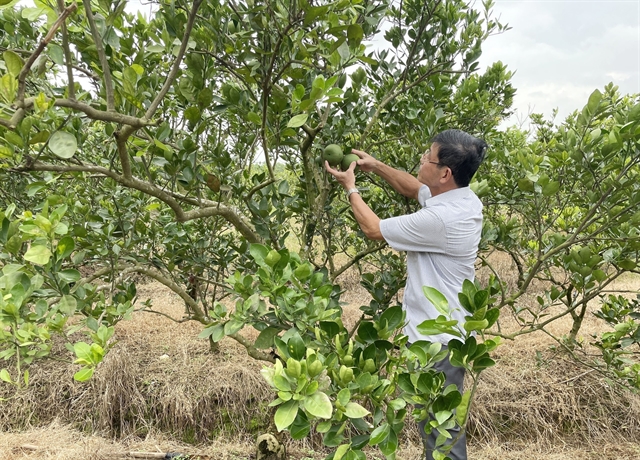 Society
Society

 |
| Farmer Nguyễn Thanh Liễu in Đồng Nai Province’s Vĩnh Cửu District tends his fruit orchard which is well developed and is fertilised with organic fertiliser that he makes from agricultural waste. — VNA/VNS Photo Lê Xuân |
ĐỒNG NAI — Đồng Nai Province has effectively restructured agricultural production to improve crop yield and quality, and farmers' income.
The southeastern province has switched from growing low-value crops into growing high-value ones, and used advanced farming techniques to increase crop yields and quality, according to its Department of Agriculture and Rural Development.
It has reduced unproductive farming areas of rice, corn, cashews, black pepper, rubber and coffee and turned them into fruit growing areas.
It has more than 74,700ha of fruit, up 1.8 per cent from the same period last year.
The fruit growing areas feature fruits that have high value and export demand, such as banana and durian.
Banana, durian, mango, grapefruit and rambutan are the province’s key fruits.
Trần Lâm Sinh, deputy director of the department, said developing agriculture production to organic standards was one of the province’s four breakthrough missions in 2020-25.
Localities in the province have boosted the application of good agricultural practices (GAP) and organic standards, and linking stakeholders in agricultural production to secure buyers and improve product value.
In Cẩm Mỹ District, Lâm San Commune has developed concentrated black pepper growing areas covering a total of 600ha that meet the requirements of export markets in the EU.
Trương Đình Bá, chairman of the Lâm San Commune Farmers Association, said the black pepper was purchased at a price of VNĐ5,000-12,000 a kilogramme higher than black pepper planted under normal methods.
Cẩm Mỹ District is expanding the cultivation of organic black pepper to meet the demand of exporting, according to the chairman.
Farmers in the district have also developed concentrated durian growing areas covering 150ha for exports. They have farm contracts with an export company to secure buyers and a stable price for their durian output.
In the last durian harvest, farmers in the district had a bumper harvest and good selling prices because of high export demand.
The province has 120 farming areas covering a total area of 24,000ha that have been granted production codes for export, according to the department.
The coded farming areas grow mostly rambutan, mango, banana and durian.
More and more farmers in the province have learned to make organic fertiliser using indigenous microorganisms for bio-conversion of agricultural waste. They use organic fertiliser made from agricultural waste to grow more than 200ha of fruits and vegetables.
The province has 1,454ha of crops planted to organic standards.
It also has 150ha of net houses and polygreen houses for growing crops.
The Department of Agriculture and Rural Development in co-operation with relevant departments and localities have implemented programmes and projects that have supported farmers to develop agricultural production in recent years.
They include a programme to use advanced farming techniques such as good agricultural practices (GAP) standards in 2021-25, a project to replant old coffee trees in 2021-25, a plan to turn unproductive rice fields into growing other high value crops this year, and a project to develop concentrated farming areas.
The department has also provided advanced farming techniques for farmers to improve the yields and quality of agricultural products.
All farming areas that grow new crops or replant new trees in the province use new and high quality seedling varieties.
Phạm Thiên Đức in Xuân Lộc District’s Xuân Thành Commune is growing 2.5ha of vegetables and earns a profit of VNĐ500 million (US$20,000) a year.
Learning techniques to renovate soil fertility and tend vegetables helped farmers in the commune to grow crops well and become wealthy, he said. — VNS